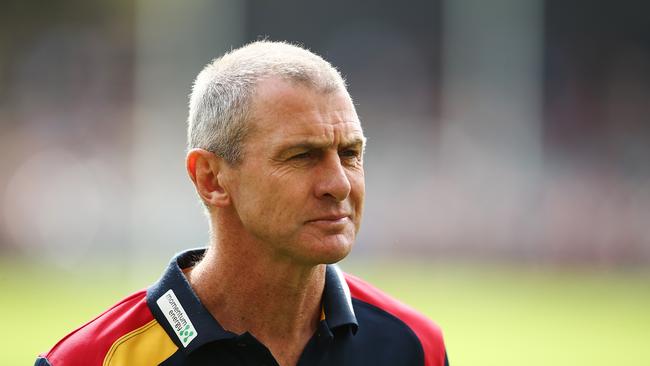Adelaide Crows coach Phil Walsh death: Drug, mental health issues part of murder case against son, Cy Walsh
THE murder case against the son of Adelaide Crows coach Phil Walsh touches on issues of mental incompetence and drug-induced psychosis, a court has heard.

THE murder case against the son of Adelaide Crows coach Phil Walsh touches on issues of mental incompetence and drug-induced psychosis, a court has heard.
The Adelaide Magistrates Court on Wednesday urged prosecution and defence counsel to end rampant public speculation about the case against Cy Walsh by informing people of the nature of the allegations against him.
Magistrate Elizabeth Sheppard made the comment in refusing applications by several media organisations to copy and publish witness statements and other evidentiary materials already filed in the case.
The court heard that material included an eyewitness account of the incident given by Walsh’s wife, Meredith.
Magistrate Sheppard said the level of speculation in the public arena was concerning and she feared publication of the evidence may “distort and exacerbate” the situation.
“May I suggest that, if the parties consider it appropriate, that they reach an agreement and perhaps hold a press conference or have an agreed statement that might be regarded as adequate to explain the status of the case thus far.
“I’m not expecting that to happen but it might be a compromise position that could be attempted to satisfy public interest in this case.”
Prosecutors allege Cy Walsh murdered his father at their Somerton Park home in the early hours of Friday, July 3.
Walsh, who is being held in the secure mental health facility James Nash House, is yet to plead to the charge.
In a court appearance earlier this month, prosecutors said they were waiting on some toxicology test results.

On Wednesday, Magistrate Sheppard invited prosecution and defence counsel to give their opinions on the media’s request for access to the documents lodged with the court.
She said she had hesitated to make a decision despite her belief the case appeared to be ready for trial in the Supreme Court.
“I think there’s just a great deal of speculation about this case, which is unfortunate,” she said.
“It seems to me that the case could be committed today and questions of whether or not a mental incompetence defence is available could be explored in the next jurisdiction.
“I do understand that there is a question that remains as to whether there might be a drug-induced psychosis problem, I might be wrong there.
“There might be an issue whether drugs played a role in the defendant becoming acutely unwell.”
Greg Mead, SC, for Walsh, objected to any material being made available.
He said public curiosity was not the same as the public interest, and the public interest was in justice being achieved through the normal processes.
He said many of the documents on the court file may prove to be irrelevant or inadmissable if his client’s case went to a jury trial, “which is still possible”.
Lucy Boord, prosecuting, agreed with Mr Mead.
“As Your Honour has identified, whether this is drug-induced psychosis or if there is an underlying psychiatric condition, is a very live issue,” she said.
“There is a very real risk of contamination of further evidence to come.”
Magistrate Sheppard declined the applications to copy and publish the material.
However, she said media organisations who had sought permission to view the documentation would be granted access to it.
